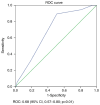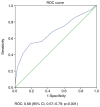Risk score model for predicting local control and survival in patients with rectal cancer treated with neoadjuvant chemoradiotherapy
- PMID: 40177134
- PMCID: PMC11962578
- DOI: 10.3892/ol.2025.14995
Risk score model for predicting local control and survival in patients with rectal cancer treated with neoadjuvant chemoradiotherapy
Abstract
The present study aimed to investigate clinicopathological factors affecting local recurrence and survival in patients with locally advanced rectal cancer (LARC) treated with neoadjuvant chemoradiotherapy (nCRT) and to create a risk-scoring model predicting local control (LC) and survival. The clinical and pathological data of 115 patients who received nCRT for LARC between February 2010 and December 2020 were reviewed retrospectively. A risk-scoring model was developed to predict LC and survival using statistically significant prognostic factors in univariate and multivariate analyses. In the multivariate analysis, the LC rate was improved in patients with a good pathological response to nCRT. By contrast, the disease-free survival (DFS) rate was significantly worse in patients with perineural invasion (PNI). The overall survival (OS) rate was significantly worse in patients who were >60 years of age, who had tumors ≥5 cm, who were PNI-positive and who had pathological N2 stage disease. Patients were grouped to analyze the ability of the scoring system to predict LC and survival. The total score was derived by assigning points to the prognostic factors in univariate and multivariate analyses and was subsequently divided into three groups according to tertile. The median LC times in groups 1-3 were significantly different at 143.6, 97.2 and 93.6 months, respectively. The median DFS times in groups 1-3 were significantly different at 136.1, 108.5 and 67.2 months, respectively, while the median OS times in groups 1-3 were significantly different at 138.3, 87.2 and 64.6 months, respectively. In conclusion, risk score modeling with prognostic factors effectively determined the difference in LC and survival between the groups. Adding effective systemic therapy to nCRT may improve results, especially in patients with multiple poor prognostic factors, including larger tumors, PNI and multiple nodal involvement.
Keywords: neoadjuvant chemoradiotherapy; prognostic factors; rectal cancer; risk score modeling.
Copyright: © 2025 Catal et al.
Conflict of interest statement
The authors declare that they have no competing interests.
Figures






References
-
- Neves ALF, Barbosa LER, Teixeira JPMdA. Prognosis in colorectal cancer beyond TNM. J Coloproctology (Rio de Janeiro) 2020;40:404–411. doi: 10.1016/j.jcol.2020.06.010. - DOI
LinkOut - more resources
Full Text Sources
